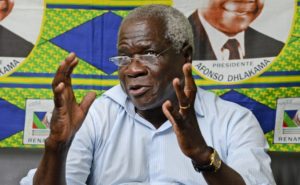 Interviewed by the independent daily “O Pais”, Dhlakama made clear that his demand for military leadership positions for his men concerns those officers, initially from the ranks of Renamo, who are already inside the Mozambican armed forces (FADM).
Interviewed by the independent daily “O Pais”, Dhlakama made clear that his demand for military leadership positions for his men concerns those officers, initially from the ranks of Renamo, who are already inside the Mozambican armed forces (FADM).
Under the 1992 peace agreement between the government and Renamo, the FADM was to be a force of 30,000 men – 15,000 from the old government army, the FAM/FPLM and 15,000 from Renamo.
But the agreement also stipulated that all recruits to the FADM had to be volunteers and when the FADM was established in1994, there were nowhere near 30,000 volunteers. The vast bulk of both the government and the Renamo armies just wanted to pick up their demobilisation pay and go home. When demobilisation was delayed, and attempts were made to pressgang fighters into the FADM, riots broke out in the assembly points set up for the members of both armies.
As a result the FADM was formed of less than 12,000 troops, with more officers than privates. About two thirds of this number came from the FAM/FPLM and one third from Renamo.
Dhlakama told “O Pais” that, in his discussions with President Filipe Nyusi, they had discussed appointing officers from Renamo who are already in the FADM “to command battalions, brigades, companies, regiments, and departments within the army, navy and air force, that is, throughout the military structure, in order to create a balance”.
“That means”, he added, “that when the commander of a battalion comes from the government, the deputy must come from Renamo. Where a Renamo member commands a brigade, his deputy must be from the government”.
“That’s the agreement we’ve achieved, without putting forward any numbers”, Dhlakama said. “Right now we are checking where we can put somebody from Renamo, and who from Frelimo can come out and be replaced by someone from Renamo”.
He had discussed this with Nyusi on 19 February, he claimed.
Dhlakama spoke as if nothing had changed in the FADM since 1994. In fact, in the intervening years nature has taken its course, and a good number of founding members of the FADM, from both Renamo and the FAM/FPLM, have died, or have retired for reasons of age or health.
Since the law on military service of 1997, the FADM has grown through conscription. All Mozambicans should register for military service in the year of their 18th birthday, and the FADM then decides who among them it wishes to recruit. When the 18 year olds register, they are not asked which political party they support.
Young Mozambicans may also volunteer for a military career, and will be trained at the Samora Machel Military Academy in the northern city of Nampula. Dhlakama’s vision of the FADM completely omits these young officers.
He made the familiar claim that FADM officers originally from Renamo have been marginalised. “They have not had the opportunity to be appointed or promoted”, he claimed. “Somebody who joined as a colonel, even today remains a colonel”. (The claim is untrue, and figures from Renamo occupy several senior positions, including Deputy Chief of Staff of the FADM).
As for the members of Renamo’s illegal militia, Dhlakama said they will be assembled in Renamo bases, and those who are not too old, or too ill, could be selected to enter the police force.
“This agreement seeks to avoid any future military operations conspiring against Dhlakama or any other Renamo figure”, he declared. “I can promise that I will no longer need my own personal guard, because public security will be for all Mozambicans”.
Dhlakama forgets that 20 years ago the government, then under President Joaquim Chissano, offered jobs in the police to members of the Renamo militia. It asked Renamo to present a list of names of potential recruits to the police. No such list was ever forthcoming, and then Dhlakama himself abruptly declared that none of his men would go into the police.
Post published in: Africa News

